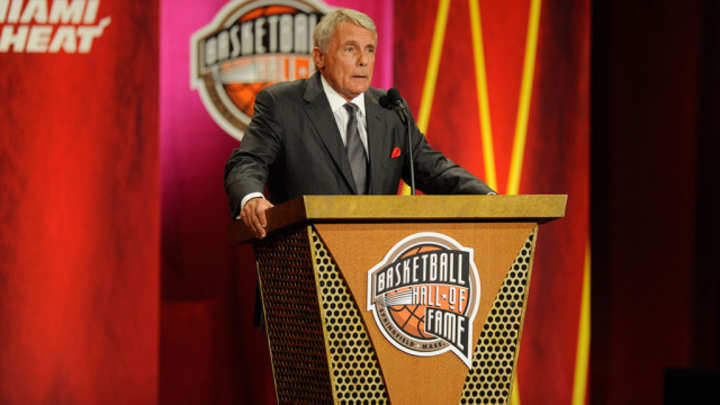Gary Williams Recalls His Biggest Recruiting Miss

Out of all the local players who left the state for college during his time at Maryland, Hall of Famer Gary Williams believes his biggest miss was a recruit few were clamoring for at the time.
Williams saw Kevin Durant, Michael Beasley, Ty Lawson, Quinn Cook and other future NBA players turn down his team in favor of bigger or more resourceful programs just years after leading the Terps to a national championship, but those players either didn’t fit the mold of what he was looking for in a player and/or had recruitments that proved too complicated -- and perhaps too dirty -- for him to navigate in good faith.
Victor Oladipo, however, was there for the taking. On an appearance on the Kevin Sheehan Show Tuesday, Williams said not offering the the future No. 2 overall pick in the NBA Draft a scholarship was perhaps his most regrettable recruiting mistake in his 22 years leading Maryland.
“I’m sure there was others, but he’s the one that comes to mind right away for me when I think about that,” he said.
Williams was far from the only one to overlook Oladipo, who committed to a rebuilding Indiana team prior to the start of his senior year of high school. At the time, Oladipo was a bench player at DeMatha Catholic, a local powerhouse that featured high-major recruits Cook, Jerian Grant, Naji Hibbert and Mikael Hopkins on its roster.
But Oladipo was the type of recruit Williams, the first coach to win a national championship without a McDonald’s All-American since the game's inception in 1977, typically had success with. Not only was he ranked outside the top-100 by recruiting services, but he had the elite athleticism to flourish in Williams’ up-tempo, pressure defense scheme, as well as the work ethic to blossom under his intense coaching style. It was seemingly a match made in heaven, but Williams -- like many other top coaches -- wondered whether he was a good enough shooter to play in a premier conference.
Crean, who was coming off a 6-25 season with the Hoosiers, didn’t have the luxury of asking such questions.
“I felt bad about that because he was the type of player that I would usually pick up on in that situation. In other words, I would know that he would be a great player for Maryland and I really missed on that.” said Williams. “That really hurts me in terms of recruiting because I took a lot of pride in being able to find guys that could really play in our system and Victor certainly would’ve been a great player in our system.”
Instead of recruiting Oladipo, Williams took a flyer on international recruit Haukur Palsson, who transferred from Maryland after one season following Williams’ abrupt retirement. Like Oladipo, Palsson was the sixth man at his high school, averaging a modest 10 points and five rebounds per game.
Williams said he’s unsure if Oladipo would’ve went to Maryland if he offered him a scholarship targeted, but “I know that I could’ve recruited him harder if I had done a better job."
“If I give it my best shot and we don’t get a player, okay, we move onto the next guy and see what you can do,” he said. “But in that case he was sitting right there.”
That wasn’t the case for players like Durant and Beasley, top recruits who had more high profile recruitments. Beasley, Lawson, Cook and others played for DC Assault, a AAU program ran by Curtis Malone, who Williams famously refused to do business with. Malone was sentenced to 100 months in prison after pleading guilty to distributing large amounts of heroin and cocaine in 2014.
“You know early on in recruiting, I thought we presented a good situation with the success of our players not just basketball-wise but academically we were doing OK. But it was difficult to get involved with some of the best players on DC Assault. So you just have to pick where you can get players. I’m not going to keep banging my head against the wall if we can’t get players, and you know, I wasn’t going to play any games. I was just going to try to recruit like I recruited everybody else,” Williams said.
"We were good enough for Steve Francis from Prince George’s County, Travis Garrison from DeMatha was a McDonald’s All-American, Duane Simpkins was a very good point guard for us and the list goes on. And to be able to coach Walt Williams, I didn’t recruit him, but in three years he goes from averaging six points a game as a freshman at Maryland to a lottery pick, I feel pretty good about that in terms of developing players. That was always a big part of our recruiting."
“I would take a guy who I thought was 85, 90 percent as good as someone else who might have a bigger name but I felt the lesser known guy might work harder, might be better for me as a coach. Any coach will tell you that you don’t do a great job with every player so you try to get players that kind of fit in with the way you think about the game and the way you think the game will be played. So if that meant I wasn’t a good recruiting, then that’s fine, people can judge that. But if you want to judge on draft picks or things like that, I did pretty well.”
